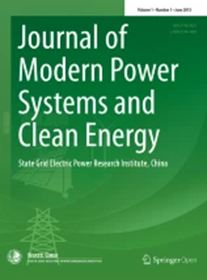提高农村电气化水平的点对点能源管理框架
IF 6.1
1区 工程技术
Q1 ENGINEERING, ELECTRICAL & ELECTRONIC
Journal of Modern Power Systems and Clean Energy
Pub Date : 2024-11-28
DOI:10.35833/MPCE.2024.000415
引用次数: 0
摘要
农村电气化是电力系统的重要组成部分,迫切需要创新和转型,以提高电气化水平。然而,各种挑战阻碍了农村电气化的进展,主要是由于偏远地区和独特的消费模式。为了有效地协调地方能源分配,提出了一种基于点对点(P2P)交互操作的能源管理框架,在提高农村电气化水平的同时,最大限度地减少对远距离传输的依赖。拟议的基于p2p的能源管理框架整合了农村地区的各种分布式发电资源,促进了邻近社区村庄之间的直接能源交易。此外,将P2P能源交易建模为纳什议价(NB)问题,该问题考虑了电网损失成本的分配和农村配电网的运行状态。为了保护个体村庄的隐私,提出了一种改进的自适应交替方向乘数法(AADMM)来解决NB问题。AADMM在参数更新过程中使用局部曲率近似方案,允许在标准的交替方向乘法器(ADMM)中自动调整固定惩罚参数。这种增强在不需要中央监督的情况下提高了收敛速度。模拟结果表明,对于整个网络和单个村庄参与者来说,运营成本都显著降低。提出的基于p2p的能源管理框架还提高了母线电压稳定性,降低了线路传输功率,从而进一步提高了农村电气化水平。采用IEEE 33总线和118总线的配电系统进一步验证了该框架的适应性和可扩展性。此外,与标准dadmm相比,AAD-MM具有更高的收敛速度。本文章由计算机程序翻译,如有差异,请以英文原文为准。
Peer-to-Peer Based Energy Management Framework for Enhancing Rural Electrification Level
Rural electrification is a crucial component of the power system that requires urgent innovation and transformation to enhance electrification levels. However, various challenges hinder the progress in rural electrification, primarily due to remote locations and unique consumption patterns. To effectively coordinate the local energy distribution, an energy management framework utilizing peer-to-peer (P2P) based interactive operations is proposed, which minimizes the reliance on long-distance transmission while enhancing the rural electrification level. The proposed P2P-based energy management framework incorporates various distributed generation resources across rural areas, facilitating direct energy transactions between neighboring community-based villages. Additionally, the P2P energy trading is modeled as a Nash bargaining (NB) problem, which accounts for the allocation of network loss costs and operational state of the rural distribution network. To protect the privacy of individual villages, an improved adaptive alternating direction method of multipliers (AADMM) is proposed to solve the NB problem. The AADMM utilizes a local curvature approximation scheme during parameter updates, allowing for automatic adjustments of the fixed penalty parameter within the standard alternating direction method of multipliers (ADMM). This enhancement improves the convergence rates without requiring central oversight. Simulation results demonstrate significant reductions in operational costs for both the overall network and individual village participants. The proposed P2P-based energy management framework also enhances the bus voltage stability and reduces the line transmission power, thereby further enhancing rural electrification levels. The adaptability and extensibility of this framework are further validated using the IEEE 33-bus and 118-bus distribution systems. Additionally, the AAD-MM shows higher convergence rates compared with the standardADMM.
求助全文
通过发布文献求助,成功后即可免费获取论文全文。
去求助
来源期刊

Journal of Modern Power Systems and Clean Energy
ENGINEERING, ELECTRICAL & ELECTRONIC-
CiteScore
12.30
自引率
14.30%
发文量
97
审稿时长
13 weeks
期刊介绍:
Journal of Modern Power Systems and Clean Energy (MPCE), commencing from June, 2013, is a newly established, peer-reviewed and quarterly published journal in English. It is the first international power engineering journal originated in mainland China. MPCE publishes original papers, short letters and review articles in the field of modern power systems with focus on smart grid technology and renewable energy integration, etc.
 求助内容:
求助内容: 应助结果提醒方式:
应助结果提醒方式:


